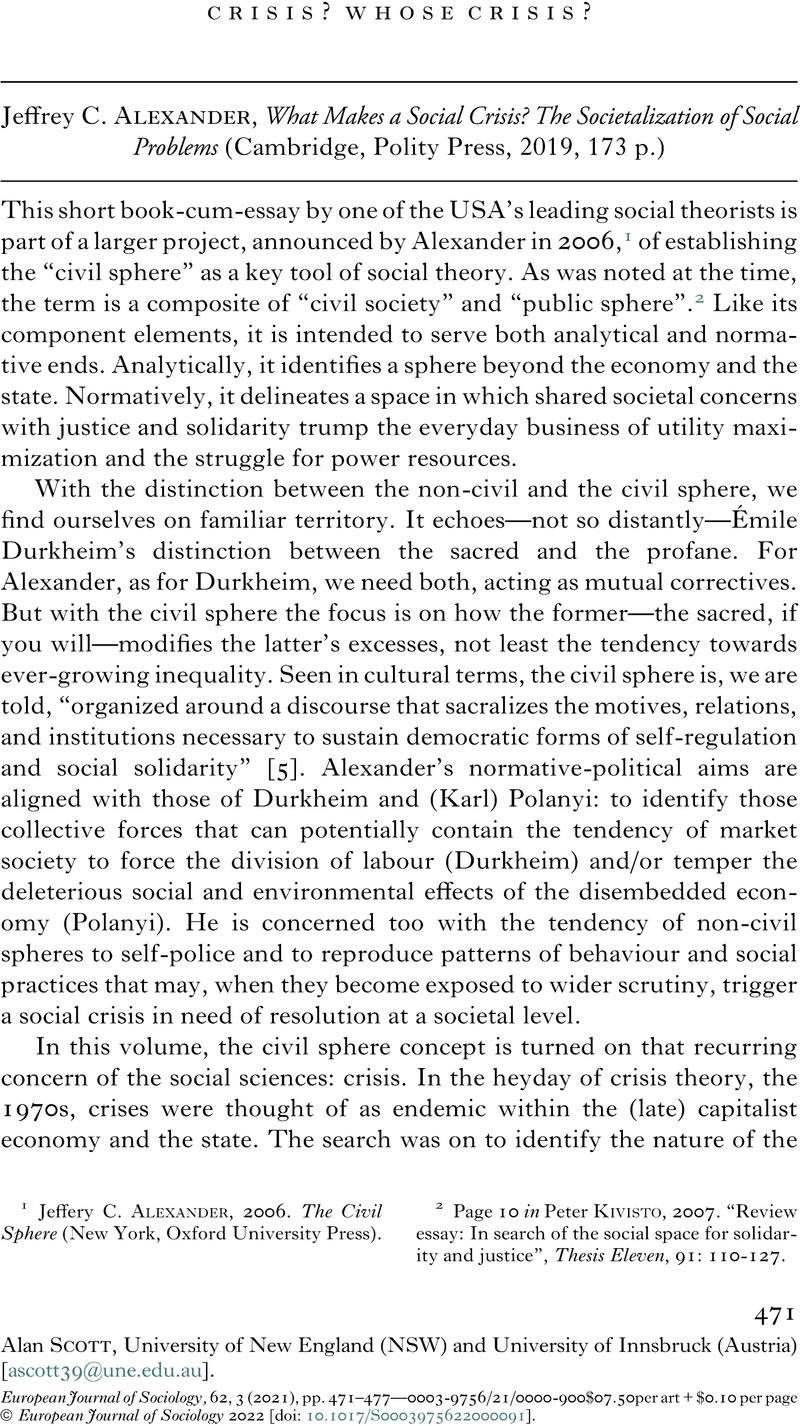No CrossRef data available.
Article contents
Crisis? Whose Crisis? - Jeffrey C. Alexander, What Makes a Social Crisis? The Societalization of Social Problems (Cambridge, Polity Press, 2019, 173 p.)
Published online by Cambridge University Press: 05 May 2022
Abstract

- Type
- Book Review
- Information
- European Journal of Sociology / Archives Européennes de Sociologie , Volume 62 , Issue 3 , December 2021 , pp. 471 - 477
- Copyright
- © European Journal of Sociology 2022
References
1 Alexander, Jeffery C., 2006. The Civil Sphere (New York, Oxford University Press).CrossRefGoogle Scholar
2 Page 10 in Peter Kivisto, 2007. “Review essay: In search of the social space for solidarity and justice”, Thesis Eleven, 91: 110-127.
3 James O’Connor, 1973, The Fiscal Crisis of the State (New York, St Martin’s Press).
4 Crozier, Michel, Huntington, Samuel P. and Watanuki, Joji, 1975, The Crisis of Democracy: Report on the Governability of Democracies to the Trilateral Commission (New York, New York University Press).Google Scholar
5 Habermas, Jürgen, 1976, Legitimation Crisis, trans. Thomas McCarthy (Cambridge, Polity).Google Scholar
6 Curran, Dean, 2020, “Review of Jeffrey Alexander What Makes a Social Crisis?”, Sociology, 54 (5): 1047–1048.CrossRefGoogle Scholar
7 Alexander, Jeffrey C., 2018, “The societalization of social problems: Church pedophilia, phone hacking, and the financial crisis,” American Sociological Review, 83 (6): 1049–1078.CrossRefGoogle Scholar
8 Schmidt, Volker H., 2020, “Eight theories of societalization: Toward a theoretically sustainable concept of society,” European Journal of Social Theory, 23 (3): 411–430.CrossRefGoogle Scholar
9 Pages 482-484, Appendix A, in Max Weber, [1922] 2019. Economy and Society. A New Translation, ed. and trans. Keith Tribe (Cambridge MA, Harvard University Press).
10 Lichtblau, Klaus, 2011, “ Vergemeinschaftung and Vergesellschaftung in Max Weber: A reconstruction of his linguistic usage,” History of European Ideas, 37 (4): 454–465.CrossRefGoogle Scholar
11 Curran 2020: 1048.
12 Page 903 in, Peter Bachrach and Morten S. Baratz, 1975, “Power and its two faces revisited: reply to Geoffrey Debnam,” American Political Science Review, 69 (3): 900-904.
13 Nancy Rosenblum, 2010, On the Side of Angels. An Appreciation of Parties and Partisanship (Princeton NJ, Princeton University Press).
14 Ibid.: 28.
15 Page 10 in, Durkheim, Émile, 1957, Professional Ethics and Civic Morals, trans. Cornelia Brookfield (London, Routledge).Google Scholar
16 Ibid.: 47.


